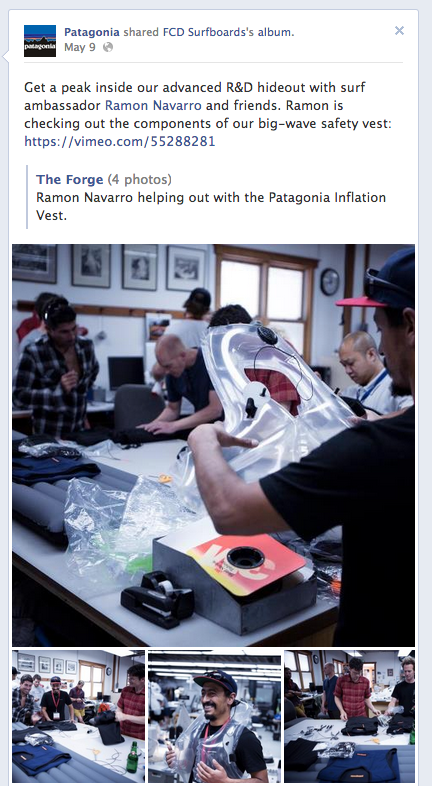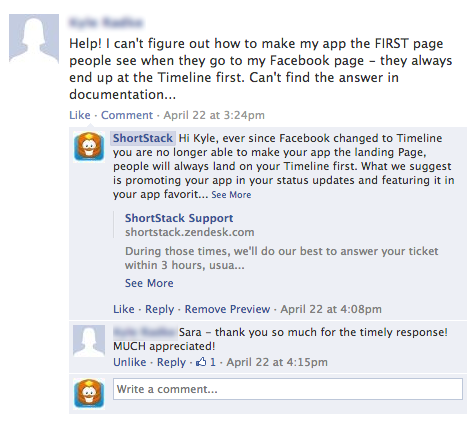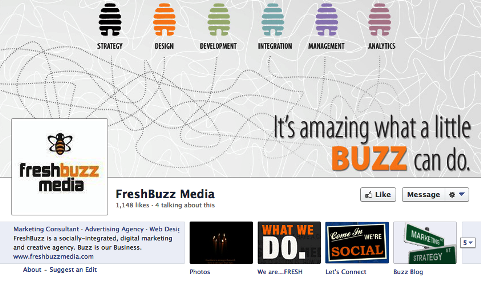Do you need to convince your boss—or a client—that Facebook is a worthy marketing investment?
In this article I’ll show you 7 things you can do to convince decision-makers of the value Facebook.
#1: Assess Your Goals
Before you can convince anyone that they need to be on Facebook, you’ll need to understand what they want to accomplish.
Remember that not every business needs to be on Facebook.
If you are in a B2B that sells concrete to two or three huge companies, LinkedIn might be a better fit.

Ask the following questions before you start planning a campaign to help you assess expectations and set goals.
- What are your expectations? If you’re starting a Page from scratch, make it clear that’s it’s unrealistic to think a Page will grow from 0 to 100,000 likes overnight.
- What kind of exposure do you want? Does your boss want to use Facebook for public relations or customer service? Or do you have a client that wants to use Facebook to promote limited-time offers or new products? How about increasing interaction (i.e., engagement) with existing customers? All of these are possible on Facebook.
- What kind of feedback would be most helpful for you? Do you hope to learn more about what existing customers think of your products? Or does your boss want to learn more demographic information?
- What demographic are you not currently reaching but is valuable to you? For example, do you hope to reach users in new regions, or older/younger or male/female users?
- What are your competitors doing that you like/dislike? If you love what someone else in your business sector is doing, explain how you can take a similar approach and what you will do to set your company apart.
- What kind of ROI do you expect? ROI is always a hot topic. Everyone wants to know how much more cash will be in the drawer if they invest in Facebook.
For starters, explain that ROI for social media can be measured by getting better customer feedback, increasing word-of-mouth marketing and gaining a better understanding of customers’ wants and needs.

#2: Do Your Homework
Since you’re asking your boss or your client to commit to Facebook, bring information that backs up your position. When doing research that will help support your pitch, focus on three areas.
Case Studies—Find examples of businesses that are similar and have vibrant Facebook presences. Explain what these brands are doing right and what you think they could be doing better. Be sure to include a couple of your client’s competitors in the roundup.
If you’re a sushi restaurant, show some examples of what other sushi restaurants are doing on Facebook.

Market Research—Look up user statistics on CheckFacebook.com to estimate the number of people within your client’s target audience who are on Facebook.

Facebook’s Future Projections—Find articles that predict Facebook user growth; focus on your client’s target market. eMarketer is a great resource for tracking industry trends and projections.
Get World-Class Marketing Training — All Year Long!
Are you facing doubt, uncertainty, or overwhelm? The Social Media Marketing Society can help.
Each month, you’ll receive training from trusted marketing experts, covering everything from AI to organic social marketing. When you join, you’ll also get immediate access to:
- A library of 100+ marketing trainings
- A community of like-minded marketers
- Monthly online community meetups
- Relevant news and trends updates
#3: Focus on the Opportunities
Based on goals, you’ll want to demonstrate how Facebook could help. Here are some different business opportunities.
For a young business. Present the branding opportunities Facebook has to offer. For example, focus on the opportunities for building awareness for a business in untapped regions, using Facebook ads and various targeting features.
Using Facebook advertising, you can target ads to people in specific cities (down to the zip code) and countries, or who have indicated specific interests on their profiles (sports, cooking, technology, travel, etc.).
For a client concerned with sales. Introduce several of Facebook’s many business-only features such as Offers. Find out whether there are conversions happening elsewhere and whether you need to connect with fans who are already on Facebook.
For example, Macy’s recently posted a code that fans could use for a discount both online and in stores.

For an established business. Facebook offers businesses unique opportunities to show off their culture and brand. Customers love to see the people they do business with letting their hair down every once in a while. It makes them feel like they “know” the faces behind the brand and helps build loyalty.
Outdoor brand Patagonia frequently gives fans a look inside factory headquarters to show fans what the company is working on by featuring photos and posts about employees.

Discover Proven Marketing Strategies and Tips
Want to go even deeper with your marketing? Check out the Social Media Marketing Podcast! Publishing weekly since 2012, the Social Media Marketing Podcast helps you navigate the constantly changing marketing jungle, with expert interviews from marketing pros.
But don’t let the name fool you. This show is about a lot more than just social media marketing. With over 600 episodes and millions of downloads each year, this show has been a trusted source for marketers for well over a decade.

Remember to point out that customers are having conversations about them anyway, so they should jump in and take some control of what people are saying. Facebook can also provide another channel for customer service, crowdsourcing and feedback.
Major brands such as Pepsi, Coca-Cola, Oreo, Lays and Budweiser have used crowdsourcing on Facebook to let their customers choose new flavors. In particular, Lays used Facebook to support their “Do Us a Flavor” competition where they asked their fans to pick the next Lays chip flavor.

#4: Be Honest About the Potential Risks
Being a target of public criticism is an issue that makes many CEOs and business owners nervous about having a Facebook presence. Part of your job is to address these fears, and tell them what you plan to do to minimize the risks.
For starters, you should create a crisis-management plan. Use the opportunity to demonstrate how you plan to deal with potentially negative comments and other feedback.
And explain why transparency is meaningful to customers. Use the opportunity to talk about the reasons customers like the transparency that social media allows—and how it can inspire loyalty. People don’t expect every business to do everything right 100% of the time, but they get really annoyed and loud if they are ignored.

#5: Estimate the Costs of Creating and Maintaining a Page
Create a simple spreadsheet or document that include estimates of what’s required to create and maintain a Facebook Page.
Here are some things to include when estimating the cost of your Facebook Page:
- Estimate the hours a week needed to maintain a Facebook Page. The number of times per day and per week a brand posts depends on the type of business, but a small business should be able to manage a Facebook Page in 30 minutes a day or less (checking three times a day and dealing with comments, etc., in three 10-minute chunks). A larger business might need a dedicated staff member who monitors Facebook around the clock.
- Estimate the cost of creating a professional-looking Facebook Page. Consider costs such as a graphic designer to create a series of cover photos and app thumbnails. And consider costs to redesign these in the event Facebook changes their specifications.
- Include a budget for Facebook ads. If you decide that Facebook advertising is something that should be part of your overall Facebook plan, bring examples of the different types of Facebook ads and how much they might cost per month.

#6: Suggest a 60-Day Trial
If your company still isn’t convinced of the value of a Facebook presence, suggest a trial period that lasts at least 60 days. If you start off with a good strategy and keep expectations realistic, you’ll be well on your way. My motto is always under-promise and over-deliver!
At the start of the trial period, you will provide them with:
- An outline that will include several realistic goals. Goals could include a 20% increase in the number of fans who engage with the Page by commenting and sharing (remember that fans who engage are more valuable than those who merely like a page), or a certain number of sales that result from a promoted deal.
- A commitment to post a specific number of times per day or week.
- A style guide for the Facebook Page, that should include suggested cover and profile photos, copy and voice. For example, do you want to be casual, informative or formal? Funny, conversational or journalistic? These details should be spelled out in a style guide.

You’ll also want to point out that social media is ever-changing. And you’ll monitor and adjust your campaign according to what you discover about your fans and followers during the trial period.
#7: Round Up the Results
At the end of the trial period, discuss the results of the test. In your presentation, you could:
- Include a wrap-up with details about accomplishments and lessons learned.
- Make suggestions for tactics you will use going forward based on what you discovered during your trial.
- Have a discussion about additional options for establishing an engaging Facebook presence, including using Facebook apps and Facebook advertising.
Use Facebook for Your Business
When you follow these steps, you’ll be able to show the value Facebook can bring to your client or business. Your company will then be able to figure out how to use Facebook and get the most out of it.
What do you think? Have you followed similar steps to get buy-in in your company? How successful were you? Please share your thoughts and questions below.
Images from iStockPhoto.
Attention Agency Owners, Brand Marketers, and Consultants

Introducing the Marketing Agency Show–our newest podcast designed to explore the struggles of agency marketers.
Join show host and agency owner, Brooke Sellas, as she interviews agency marketers and digs deep into their biggest challenges. Explore topics like navigating rough economic times, leveraging AI, service diversification, client acquisition, and much more.
Just pull up your favorite podcast app, search for Marketing Agency Show and start listening. Or click the button below for more information.


